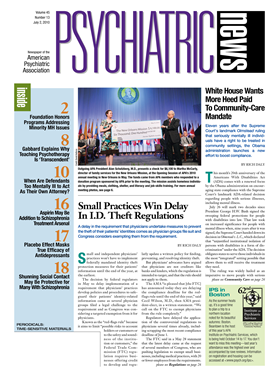In a dizzying series of back-and-forth actions that began months ago, the House of Representatives and the Senate have both passed legislation to delay the scheduled 21 percent cut to Medicare physician reimbursements until November 30.
On May 28, the House passed a 19-month delay in the physician reimbursement cuts, but on June 18, the Senate passed only a six-month delay. The Senate also passed a 2.2 percent increase instead of the 21 percent cut. On June 24, however, the House voted 417-1 to adopt the Senate bill. The 2.2 percent increase will be applied retroactively to claims paid on or after June 1, the date on which the 21 percent cut went into effect.
Prior to the latest round of activity, Congress had dropped plans to pass a five-year delay. Proponents of the five-year delay hoped that it would provide sufficient time to work out a permanent overhaul of the much-criticized payment system.
The legislation proposing a longer delay ran into opposition from Republicans concerned about deficit spending. Their stand drew the ire of President Obama, who derided Republicans as "willing to walk away from the needs of our doctors and our seniors" in comments during his June 12 weekly radio address. The scaled-back time frame of the payment freeze was described by congressional staff as a concession to growing concerns about how to pay for a longer freeze. Putting a six-month freeze on the 21 percent cut required by Medicare's automatic payment formula and adding a 2.2 percent increase to physician payments is projected by the Congressional Budget Office (CBO) to cost $6.5 billion, compared with $23 billion for a 19-month delay and an $88.5 billion cost for a five-year freeze.
The effort by many in the medical field to avoid the cut has become entangled in an increasingly fiscally conservative atmosphere in Congress. Fiscally conservative and politically vulnerable Democrats have pressured their leadership to limit federal spending that is not offset by taxes or cuts elsewhere in the budget. Such so-called offsets are required for nonemergency spending under Congress's “pay-as-you-go” rule. No offsets have been offered for the physician payment freeze.
The AMA, which is leading the lobbying effort on the Medicare payment rate issue, along with other physician organizations, continues to call for a permanent repeal of the funding formula used by Medicare. The formula, called the sustainable growth rate (SGR), requires the payment cuts as a way to offset other spending growth in Medicare.
Temporary delays in Medicare payment cuts “just treat the symptoms and not the disease,” said then AMA President J. James Rohack, M.D., in a press conference call in early June.
The cornerstone of the AMA's call for immediate replacement of the SGR stems from the growing cost of waiting to do so. The AMA says that replacement now would cost about $250 billion but repealing it in five years, for example, would cost more than $500 billion, citing an analysis by the CBO.
“More delays will only grow the problem,” Rohack said.
That's also the message of a multimillion-dollar national ad campaign launched by the AMA in June designed to pressure Congress into devising a permanent replacement system this year (Psychiatric News, June 4).
The campaign emphasizes that physicians are souring on Medicare because of ongoing uncertainty about what they will be paid, according to Rohack. That uncertainty stems from the increasing frequency with which Congress has used short-term fixes to head off major payment cuts in recent years. Additionally, Medicare officials have used emergency action to forestall some scheduled cuts because they technically went into effect before Congress could enact a postponement.
The impact of the frequently looming payment cuts has led to nearly 1 in 5 physicians limiting the number of Medicare patients they see, according to an online AMA survey of more than 9,000 physicians who care for Medicare patients. Perhaps most ominously, nearly 60 percent of them considered opting out of Medicare under this year's threat of a 21 percent cut.
The continuing refusal of congressional leaders to act on revising the payment formula comes despite the strong backing that the AMA and other physician groups gave to the federal health care reform legislation enacted earlier this year. Physician advocates hoped that this support would push Congress to act this year on a permanent replacement to the Medicare payment formula.
Asked by a reporter if he regretted that the AMA provided that support now that a permanent payment overhaul has failed to materialize, Rohack said he did not, because many of the changes included in the law were needed to improve the overall health care payment and delivery system.
Instead, Rohack questioned the CBO's estimates of the cost of replacing the payment formula, which he said ignores the savings in hospital costs resulting from better-treated patients.
